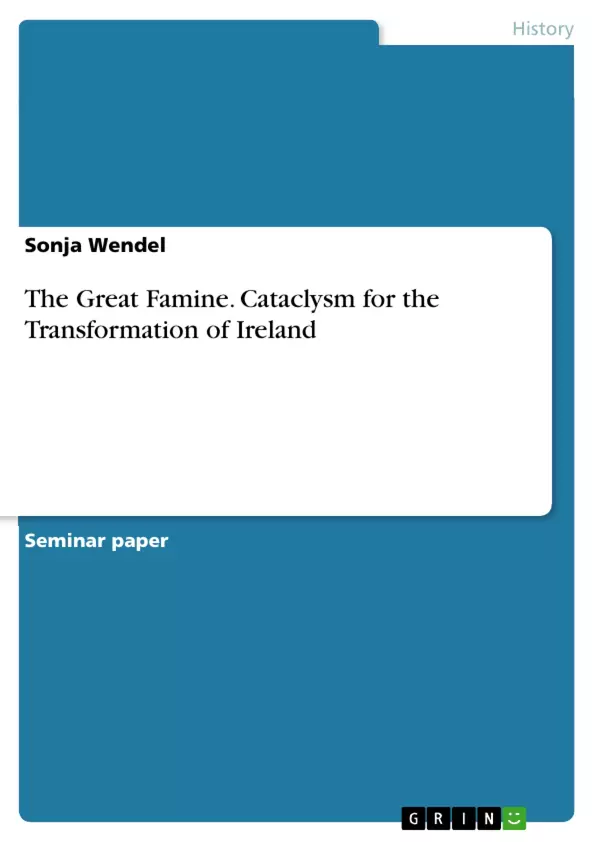Historical research moved away from dramatic Irish politics towards a rather social and cultural focus. Studies in the field of history to my opinion are studies about humanity and emotions and not just about elected data and research. It is evident that the Great Famine and its data are an important issue within Irish history. Although this experience was a touchstone for Irish people, as Murphy also stated: "Irish economic history in the nineteenth century was about food and land. Clearly the most important event of the century as far as people's lives were concerned was the cataclysm of the Famine in the 1840s" [Murphy 2003; 9], it was just one and not the only reason for the changes of and within Ireland. This essay aims to outline and describe in what ways and to which extent the Famine initiated the Irish transformation.
Inhaltsverzeichnis (Table of Contents)
- Introduction
- Ireland Before and Throughout the Famine
- Ireland Before the Famine
- The Famine Years
- Consequences of the Famine
- Demography of Post-Famine Ireland
- Social Life and Religious Changes After the Famine
- Industrial Development and Agricultural Shifts
- Political Changes Imposed by the Famine
- Conclusion
Zielsetzung und Themenschwerpunkte (Objectives and Key Themes)
This essay explores the impact of the Great Famine on Ireland's transformation, emphasizing that it was a catalyst for existing social and political changes rather than a sole cause. It examines how the Famine accelerated pre-existing trends in Irish society, culture, and politics.- The historical context of Ireland before the Famine
- The causes and consequences of the Famine
- The impact of the Famine on Irish demography, social life, religion, industry, and agriculture
- The role of government policies and responses to the Famine
- The lasting legacies of the Famine on Irish society
Zusammenfassung der Kapitel (Chapter Summaries)
Introduction
This chapter sets the stage for the essay, highlighting the importance of the Great Famine in Irish history. It argues that while the Famine was a pivotal event, it was not the sole cause of Ireland's transformation but rather a powerful catalyst for changes already in motion.Ireland Before and Throughout the Famine
Ireland Before the Famine
This section examines the conditions of pre-Famine Ireland, focusing on the rapid population growth, the reliance on the potato as a staple food, and the prevalence of cottier tenancy. It also touches upon the impact of the Napoleonic Wars on Irish agriculture and the subsequent economic crisis that weakened the rural economy.The Famine Years
This section delves into the origins of the Famine, specifically the arrival of the potato blight in 1845. It discusses the devastating impact of the blight on the potato crop, the widespread starvation, and the government's inadequate response. This includes exploring the "laissez-faire" policies of the Russell government and the limitations of public work schemes. It also highlights the role of the Quakers in providing relief efforts.Consequences of the Famine
This section focuses on the lasting impacts of the Famine on various aspects of Irish society, including:Demography of Post-Famine Ireland
The chapter examines the demographic shifts resulting from the Famine, including mass emigration and a drastic reduction in population.Social Life and Religious Changes After the Famine
This section explores the changes in social structures and religious practices that followed the Famine, including the breakdown of traditional rural communities and the rise of new religious movements.Industrial Development and Agricultural Shifts
This section analyzes the impact of the Famine on Ireland's industrialization and agriculture, particularly the shift from traditional potato-based farming to a more diverse and commercialized agricultural system.Political Changes Imposed by the Famine
This section delves into the political changes triggered by the Famine, including increased political activism, the emergence of new political parties, and the rise of Irish nationalism.Schlüsselwörter (Keywords)
This essay examines the Great Famine in Ireland, its causes and consequences, focusing on its impact on Irish society, culture, and politics. Key terms include: potato blight, cottier tenancy, demography, emigration, social change, religious change, industrial development, agricultural shifts, political change, government response, laissez-faire, Quaker relief efforts, and Irish nationalism.Frequently Asked Questions
What was the "Great Famine" in Ireland?
The Great Famine (1845-1852) was a period of mass starvation and disease in Ireland caused by a potato blight that destroyed the primary food source of the population.
Was the Famine the only reason for Ireland's transformation?
No, while it was a "cataclysmic" event, the essay argues it acted as a catalyst that accelerated social, economic, and political changes that were already beginning before the 1840s.
How did the Famine affect Irish demography?
It led to a drastic population decline through approximately one million deaths and over one million people emigrating, mostly to North America and Britain.
What was the "laissez-faire" policy?
It was the British government's economic philosophy of non-interference, which led to an inadequate response to the crisis as they believed the market would eventually solve the food shortage.
How did Irish agriculture change after the Famine?
There was a significant shift from small-scale potato farming and cottier tenancy to larger, commercialized livestock farming and diversified agriculture.
- Quote paper
- BA Englisch (teacher's degree) Sonja Wendel (Author), 2010, The Great Famine. Cataclysm for the Transformation of Ireland, Munich, GRIN Verlag, https://www.grin.com/document/229769



